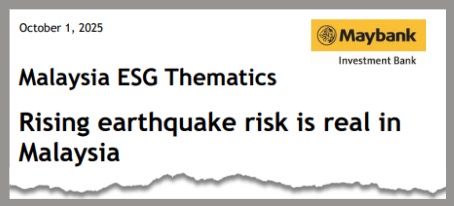| Segamat, a sleepy town in Johor, had a rude awakening on August 24, 2025, when it was shaken by a magnitude 4.1 earthquake at 6:15am, the first ever recorded in that area. According to reports, tremors were felt not just in Segamat but also in Negeri Sembilan, Melaka, and southern Pahang, sparking panic among residents and even causing car alarms and ceiling plaster to come crashing down at a prayer hall.  |
No Longer Safe from Tremors
While a 4.1 is considered “weak,” it’s not a one-off, says Maybank Investment Bank in a report "Rising earthquake risk is real in Malaysia".
The report was published after Maybank hosted an engineering earthquake expert, Prof Ir Azlan Adnan, for its ESG- webinar titled “Malaysia’s Seismic Reality: A Look at Earthquake Risk and Preparedness”.
The report says: “... an earthquake magnitude 5.0 may start to cause serious damages, exemplified by Ranau’s 2015 earthquake in Sabah with a magnitude of 5.9-6.0”.
The magnitude 6.0 earthquake resulted in 18 deaths on Mount Kinabalu, including that of seven Singapore primary school children who were scaling the mountain.
And guess what? “There are many fault lines in Peninsular, Sabah and Sarawak, though not all are active.”
• KL itself sits atop the Kuala Lumpur Fault Line, albeit inactive for now. • Potential hotspots -- Bukit Tinggi (Pahang), Kuala Pilah (Negeri Sembilan), Manjung (Perak), Temenggor (Perak), or Tasik Kenyir (Terengganu) on the Peninsula—and Lahad Datu and Kudat in Sabah. The report cautions: “A 6 magnitude earthquake is possible for Peninsular, likely in Bukit Tinggi… up to 7 magnitude is possible in Sabah, likely in Lahad Datu and Kudat”. |
The report says: "Malaysia lies within the broader Pacific Ring of Fire and is exposed to intraplate earthquakes, contrary to earlier belief that it was outside this zone."
Types and Dangers of Earthquake Hazards
The report breaks down the Richter scale damage, where anything over 6.0 can cause “damage to a moderate number of well-built structures in populated areas,” and 7.0 would “cause damage to most buildings.”
That’s not the kind of news anyone wants to hear in a city packed with high-rises built before 2017, when proper seismic codes kicked in.
Mitigating the Risk: Businesses To Watch
Turns out, earthquake resilience comes at a price—1% to 5% more for structural costs, according to the report.
But the report is clear: “The additional seismic design cost… will outweigh the financial loss of subsequent repair or replacement in the event of an earthquake.”
That’s a win for construction companies, who stand to gain from a spike in building upgrades and post-quake repair jobs: “Construction companies are potential beneficiaries on potentially higher job orders as building owners spend a little more to make their buildings earthquake-resistant”.
It’s not just builders—insurers will also have a role.
Notably, earthquake insurance is usually sold as an optional add-on in Malaysia—something people may start reconsidering, especially after “greater awareness could prompt more comprehensive insurance coverage for the properties”.
The report suggests, “Insurance companies are potential beneficiaries from potential revenue upside, for greater awareness could prompt the general public to seek out more comprehensive natural disaster coverage for their properties.”
|
The Maybank report is here.

